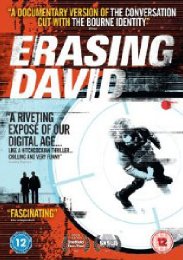Erasing David
Erasing David
Over the last decade the argument over the surveillance state and the technology used in support of it has been big news. Whether it's ID cards, the DNA database or the vast proliferation of CCTV, you cannot escape the feeling that the State knows (or wants to know) a lot about you and is watching you. We know that laws brought in to combat terrorism as quite sensible measures on the whole have been hijacked and used for other purposes, whether evicting an old man heckling from a Labour Party conference to councils spying on what people are putting in their bins or checking where they live as part of schools admission policy.
David Bond, a documentary maker, found himself wondering about the scale of the surveillance state after receiving a letter from HMRC informing him that he was one of the many whose details had been lost on the 2 missing CD's that caused a bit of a furore last year. Bond began to wonder just how much information about us is out there and just how easy would it be to remain 'off the grid', echoing in his ears are the words of those who wish to impose ever tighter controls on the population;"if you've done nothing wrong, you have nothing to fear". Was this true?
Bond, married with a child on the way, decided that he would attempt to go on the run for a month with private detective agency Cerebrus on his tail. With only his name to go on, how long would it take them to gather enough information for the detectives to track him down?
Extras
A nice range of extras that cover some of the points made in the documentary, some just essentially extended scenes. One particularly good extra is an excerpt from a panelled Q&A after the film's premiere, a panel that included Shami Chakrabati, David Davies and Will Self amongst others. They discussed some of the issues raised within the film as well as more general concerns, and although this is a brief excerpt, the full video is hosted upon the film's website.
Overall
This was an interesting documentary but slightly flawed. The man on the run scenario, if involving the security services or the Police, would have been over before it had begun, but it was interesting to see a private detective agency attempt to piece together bits of his life using information in the public domain, plus a couple of technical tools that had to allow them to track his location when he logged onto a specially built website. The aim was to 'go off grid' for 30 days and whilst he didn't make that due to, it must be said, being soft and not 100% committed (due to his wife being pregnant) to the cause, it still made for a focussed and interesting chase documentary.
The documentary focussed on the simpler things within the public domain such as Google searches and Facebook updates, as well as rooting through rubbish to piece together his life. Whilst it did lead in the end to his being 'caught', it kind of misses the point. Living in a modern bureaucracy, we forget the myriads of information (mostly the same) that we provide to so many different agencies and organisations - some of them Central Government, some Local Government, some just private organisations. Then when you consider that some Government dept's such as DVLA have been allowed to sell on information to 3rd parties in the same way that private organisations also do, you can see the scale of the problem. Just think for a second. How many organisations have you interfaced with over your life that will have stored information about you? Did you include supermarkets here? Or on-line retail websites like Amazon? Supermarkets can build a profile of you from your purchases based on your points storecard and just how do you think the Amazon on-site recommendations of things you might like comes from? This is not to say we should start panicking or stop providing data (you can't if you wish to do or apply for anything) but just that we provide data all the time without thinking about it and are probably on over at least 100 databases minimum in some capacity.
Everyone is at it and this is why data security is so important. Bond was caught in the end by the simplest of telephone enquiries that only needed a couple of pieces of information in order to verify what the 'chasers' were looking for, neither that difficult for the detectives to retrieve. The hugely ironic part of this exploration of the surveillance society was the final shot of the film, showing Bond and his wife registering the birth of their child, which if you think about it is where the surveilance society begins for each one of us...























Your Opinions and Comments
Be the first to post a comment!